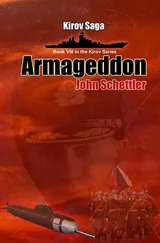Lütjens considered his options. “And what if we fail to find a tanker in short order? How much fuel do we have for regular operations?”
“Two days, sir,” said Lindemann. “We must rendezvous with an oiler or reach a friendly port in 48 hours.”
The admiral thought for some time on this. Bismarck had broken out, at little cost, but she had no laurels to take home should they turn for a French port now. Yet the prospect of leading his old battle fleet of Scharnhorst and Gneisenau out, this time with Bismarck as the flagship, was a powerful lure.
“This latest signal from Group West,” he said, holding up the translated cable. “It seems the British have put together another heavy convoy with reinforcements bound for Alexandria. We’re beating them about the head and shoulders on Crete and the rush is on to get reinforcements to that theater. Group West is of a mind that this convoy is now lightly defended.”
“Sir?” Lindemann found it hard to believe that the British would take such risks.
“Yes, Convoy WS-8B was spotted and her position fixed. We lost a big Kondor seaplane tracking her. The convoy put to sea and was joined by HMS Britannic , the fast troop ship that has been running to New York. The Georgic is also steaming in that convoy. What trophies they would make, eh Lindemann? And there are other prizes to be had there, numerous troop ships were reported. There were no battleships spotted with the convoy either, most likely reassigned to look for us! But now we will be more than happy to take on that duty for the British. Group West gives her position and heading to the east of us, between our position and Brest. I want to turn 70 degrees to port and head east at your earliest opportunity. We will catch this convoy, get our just laurels, and then refuel at Brest with Scharnhorst and Gneisenau . When next we set sail, there will be no force on the sea capable of threatening us.”
Lindemann had some misgivings about this plan, much preferring his tanker rendezvous instead.
“What about Prince Eugen, sir?”
“She will follow your plan, Lindemann.” He threw a bone to the captain, sensing his mood on the matter. “Have her fall astern and we will take the van just before we make our turn. Then we will break west and Prince Eugen will continue on this heading with the aim of leading the British off on a merry chase.”
“I see,” said Lindemann, still concerned. “And what if the British do not follow her, sir? What if they follow us instead?”
“We will not know that for some time, captain. But we are losing our cover of darkness. That cruiser shadowing us is nowhere to be seen. Signal Prince Eugen at once and inform her of these orders. We will execute as soon as she is ready.”
“Aye, sir.”
~ ~ ~
AboardHMS King George V Admiral Tovey was beginning to feel very alone. His entire fleet was nearing the point of no return on fuel, and the problem was particularly acute with his cruisers. Kenya had been out in front for some time now, but as dawn approached he was forced to order her to fall off station.
Lindemann had been correct on two counts. The cruiser had vanished, yet the first reason was that HMS Kenya’s perfect Mauve camo scheme had again blended in to the violet grey sky, making her virtually invisible in these hours of early morning light. The second was that Kenya could no longer stand her watch. The cruisers were running very low on fuel and Tovey also had to decide what to do with HMS Victorious . The carrier was going to run out of fuel well before King George V . He could not send Victorious home alone with U-boats about, and so the shorter legged cruisers would set the time of her departure, and serve as escort when she was dismissed from the task force. When Kenya vanished that morning, she would not return, and when the cruisers left with her, Tovey’s Home Fleet would have been reduced to his single ship. Hood and Prince of Wales were still running south on a parallel track, but were some forty miles to the west.
With the cruisers gone it would be up to King George V to keep a hold on Bismarck . Even now he was burning more precious fuel, increasing to 28 knots to try and make up the ground lost over night. He needed to make radar contact again quickly, but a last idea occurred to him, and he discussed it with his Chief of Staff.
“I’m afraid sending in the Swordfish again this morning will be fruitless, Brind,” he said. “But Victorious could do us one last service as she leaves and fly a search operation. What do you suggest?”
“Southwest arc, sir,” said Brind with little hesitation. “If I were Bismarck I’d see about a turn in that direction, if she already hasn’t done as much. There will be U-boats to form a picket line for her in the Atlantic, and she can rendezvous with an oiler there.”
“Make it so,” said Tovey.
Ten minutes later Victorious was turning into the wind for the last time on this mission, and seven of her nine Swordfish lumbered down the armored deck to take wing again, forming up and turning on a heading of 225 degrees southwest before they began to fan out on their individual search tracks. Each plane would fly out and back, with all seven plotted in such a way as to search a near 180 degree arc. When they landed on Victorious it would be their final mission in the hunt for Bismarck , and one came home with some very good news.
~ ~ ~
Lt. Pollardwas in plane 5K off the Victorious that morning, his observer, Beattie, intently scanning the sea with his field glasses as they searched. His was the leftmost slice of the arc Victorious was searching, and it mostly covered the edge of the course where they had last sighted the battleship.
The winds were up and the sky was still broken with banks of ragged clouds, tinged pink and grey in the early morning hours. Not having radar in their plane, they searched for some time along the track, seeing nothing. Pollard was watching his fuel gauge closely as well. When he has consumed forty percent he would begin making a gradual turn to begin the homeward leg of his pattern.
When he did so Beattie spoke up, shouting over the engine noise. “Aren’t we turning the wrong way?”
“Too many clouds in that direction,” Pollard shouted back. “We won’t see a damn thing. This track is clear.”
They flew on for some time, and then Beattie noted a dark shape ahead, trailing a long, white wake in the sea. “Ship ahead!”
Pollard looked about, plotting the best way to approach under cover without losing the contact. He slipped into a cloud and when it broke to the clear in places, Beattie had a good look at the target through his field glasses. Amazingly, there was no flak from the ship.
“What’s her heading?” said Pollard.
“Looks to be due south.”
“That’s the Germans then. None of our ships this far out. Get a message off quick now. Sighted one ship bearing course 180 degrees south, our position.”
Beattie tapped out his intelligence report and, low on fuel, they banked into a cloud and turned north for Victorious , some sixty miles away now by Pollard’s calculations.
“I hope to bloody God we can still find Vicky,” said Pollard. “But what in the world is old King George going to do if she finds the Germans all on her own?”
Pollard had little to worry about just then, because the ship they had sighted was the cruiser Prince Eugen , still steaming due south as Lütjens had ordered. Her companion, Bismarck had bid her farewell and good hunting, turning 70 degrees to port ten minutes earlier.
Читать дальше












